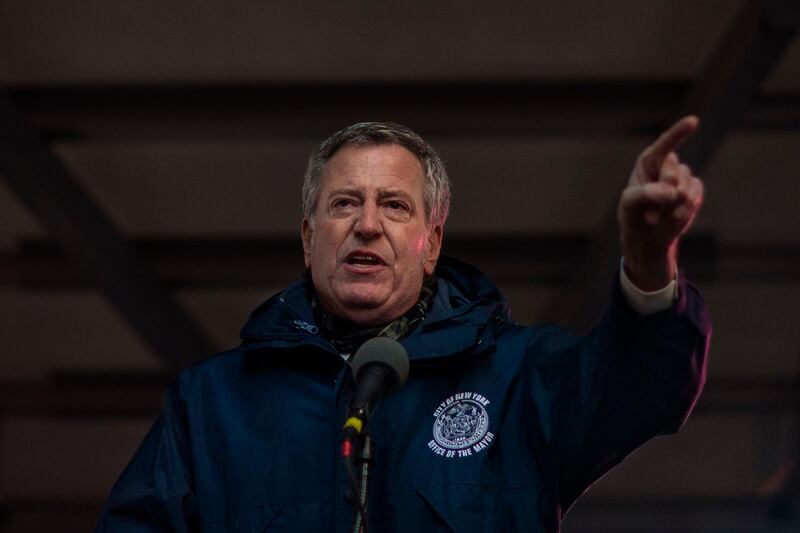New York city has accused drug manufacturers of “murder” by pursuing a multimillion dollar campaign of misinformation to persuade patients and prescribers that opioid medicines are safe and effective for widespread use without any evidence.
The city is the latest to launch a lawsuit against Big Pharma as it tries to tackle a deadly epidemic that is costing tens of thousands of lives across the nation.
Civic leaders are borrowing tactics first deployed against Big Tobacco to both recover the costs of a public health emergency and to change corporate behaviour.
New York is seeking $500m in damages from what Bill de Blasio, the city’s mayor, described as “corporate drug pushers”.
“Who’s getting away with bloody murder right now? The big pharmaceutical companies,” he said at a news conference in the Bronx.
More than 1,000 people died in the city in 2016 from overdoses including opioids - the name for synthetic and natural opiates covering everything from opium to powerful modern versions such as fentanyl – more than the combined number of deaths from car accidents and homicides.
It represents a local snapshot of a national nightmare.
In 2016, opioid-related overdoses grew by 28% on the previous year, killing more than 42,000 people across the country.
The toll was blamed for a second consecutive annual fall in American life expectancy, an extraordinary reversal after years of improving longevity.
While some people are introduced to opioid drugs on the street, many people become addicted to powerful drugs prescribed almost routinely for chronic pain.
A recent study by the National Institute on Drug Abuse found that one third of American adults were prescribed the drugs in 2015. That is about 92 million people.
High profile deaths have included the pop star Prince, who accidentally overdosed on fentanyl in 2016, and the rock star Tom Petty. His family this week said they hoped his example would illustrate the dangers of such medicines.
The lawsuit lays much of the blame with what it says is the deceptive marketing of drug makers and by distributors bringing large amounts of prescription painkillers into New York.
It targets eight manufacturers and distributors, including Purdue Pharma, Teva Pharmaceuticals, Johnson & Johnson, and Janssen Pharmaceuticals, which deny the allegations.
In particular, it says the problem stems from the 1990s when manufacturers sought to extend the market for drugs that had previously been limited to pain management of terminal cancer patients. They created a new market for the treatment of other chronic pain in the search for “blockbuster profits”.
“The manufacturers’ campaign was and is misleading,” it says. “The Manufacturers knew or should have known, that prescription opioids have never been demonstrated to be an effective treatment for chronic, non-cancer pain outside the scope of palliative care and that they are highly addictive and subject to misuse.”
It adds that there have been no long-term studies to show the safety and efficacy of such drugs, or their suitability for treating everything from migraines to back pain.
Nonetheless pharmaceutical companies spent hundreds of millions of dollars to woo influential doctors and support patient advocacy groups in spreading their message about a new class of wonder drug, it alleges.
“As a result, the number of prescriptions skyrocketed, resulting in misuse and addiction for millions of individuals,” the complaint reads.
John Puskar, director of public affairs at Purdue, said the company was deeply troubled by the illicit opioid abuse crisis and was dedicated to being part of the solution.
“We vigorously deny these allegations and look forward to the opportunity to present our defence,” he said.
Sarah Freeman, a spokeswoman for Janssen Pharmaceuticals, which is owned by Johnson & Johnson dismissed the allegations as “baseless”.
“Our actions in the marketing and promotion of our opioid pain medicines were appropriate and responsible,” she said.
Cities, states and federal agencies are all trying to grapple with the crisis. New York joins Philadelphia, Delaware, Oklahoma and Chicago in launching lawsuits.
On Tuesday, the Drug Enforcement Administration said it had eased regulations to allow more healthcare professional to prescribe a medication used to treat opioid addiction. Buprenorphine has been credited with helping manage withdrawal and addiction but was seldom available outside cities.
In October, president Donald Trump declared the opioid epidemic to be a public health emergency, but was roundly criticised for failing to offer additional funding.
And this week, a member of the president’s opioid commission, which submitted its final report last month, described his frustration at the lack of money and absence of action.
“Everyone is willing to tolerate the intolerable – and not do anything about it,” Patrick Kennedy, a former Democratic congressman told CNN. “I’m as cynical as I've ever been about this stuff.”






